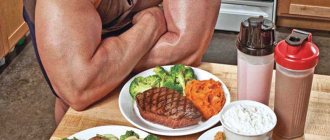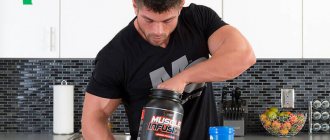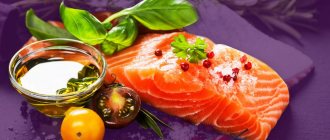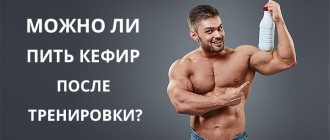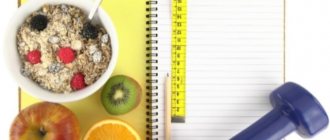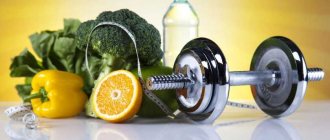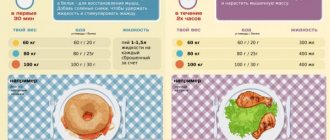Eating a banana after a workout is not only a “properly closed carbohydrate window”, but also a guarantee of healthy muscle metabolism. Unfortunately, many athletes doubt whether it is possible to eat bananas after training, but in vain: nutritionists agree that it is not only possible, but also necessary.
These fruits “supply” the body with a lot of useful substances:
- Potassium;
- Magnesium;
- Alimentary fiber;
- Vitamins of groups B, C, A;
- Fructose.
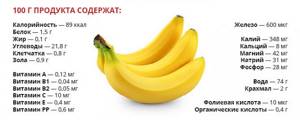
100 g of ripe fruit contains:
- Proteins – 1.5 g;
- Fats – 0.1 g;
- Carbohydrates – 21.8 g.
One banana contains on average about 90 kcal.
How are bananas good for athletes?
Surely many of us have seen how professional athletes consume bananas before or between competitions. This yellow fruit is indispensable in the diet of racers, tennis players, football players and other athletes. But why is banana so good and attractive?
Let's look at the composition of this fruit. Is it fruit? According to botany, a banana is a berry. But in cooking it is still considered a fruit. The calorie content of a banana is 95 kcal per 100 grams, but despite this, it is considered a dietary product. The chemical composition is incredibly rich. Banana pulp contains:
Vitamins:
- A - prevents the formation of cancer cells and the development of cardiovascular diseases;
- Group B (B1, B2, B4 (Choline), B6, B9) - fights stress and insomnia, improves the condition of hair, nails and skin;
- E - prolongs the lifespan of cells, improves skin condition;
- C - strengthens the immune system and protects against infections;
- K - improves the functioning of the gastrointestinal tract;
- PP - is an antioxidant, that is, it suppresses oxidation;
- Beta-carotene is also an antioxidant that improves immunity and mental performance.
Micro and macroelements:
- iron;
- potassium;
- calcium;
- magnesium;
- zinc;
- sodium;
- fluorine;
- fructose;
- cellulose.
In addition to the fact that bananas lift your spirits and relieve stress, their consumption has a beneficial effect on our gastrointestinal tract. Thanks to potassium and magnesium, the condition of bones and muscles, and the heart improves. A beneficial effect on the condition of nails, skin and vision has been proven.
If you play sports, then you need bananas to restore expended energy. They also reduce muscle fatigue and increase endurance of the entire body. And, oddly enough, they help reduce weight. So, to gain muscle mass after training, you should eat cottage cheese, not bananas.
What are the health benefits of bananas?
Many scientific and medical studies confirm the high value of bananas for health and the full development of the human nervous and cardiovascular systems.
- The presence of the amino acid tryptophan allows you to get rid of depression and improve your mood, which often disappears due to the high intensity of physical and psycho-emotional stress.
- The high content of potassium (mineral electrolyte) allows you to strengthen the heart and blood vessels at any age, and reduce blood pressure.
- The body requires fiber daily to effectively manage weight. Just one banana a day provides up to 10% of your fiber needs.
- The fruit contains large quantities of fructooligosaccharides, the presence of which allows calcium to be better absorbed. The result is strong bones that can withstand heavy loads.
- Vitamin A helps, if not restore visual acuity to 100%, then improve the functioning of the visual organ, improve its ability to clearly distinguish the contours of objects in the dark.
- Pectin promotes the rapid elimination of toxins and impurities, the water balance is under control. Intestinal motility also improves, digestive problems disappear (frequent constipation, bloating, feeling of heaviness).
- The central nervous system and brain work harmoniously and more productively, absent-mindedness disappears, and concentration becomes better.
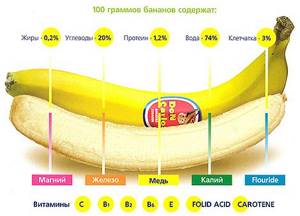
Bananas help you quit smoking faster, and this is very important for an athlete who has such a destructive habit.
Can you eat bananas after strength training?
Need to! If you are engaged in strength training and have been asking this question for a long time, then cast aside all doubts and feel free to include bananas in your post-workout diet. During physical exercise, our body loses a huge amount of strength and energy, and so that sport does not turn into exhaustion and exhaustion for us, energy reserves must be replenished. At this moment, a nutritious and healthy fruit comes to our aid. Thanks to fast carbohydrates, muscles receive the necessary supply of glycogen. Glycogen is a complex carbohydrate that represents excess glucose entering the body. After training, the level of glucose in the blood decreases and fatigue appears , this is when glycogen comes into play, which breaks down and provides the necessary amount of glucose to replenish energy in the muscles. Adequate glycogen stores are important not only for muscles, but also for healthy liver function, and therefore eating foods containing large amounts of carbohydrates is a must for athletes. Bananas also replenish potassium, which helps you avoid cramps after grueling workouts. But don’t go overboard with the number of bananas: 2–3 pieces are enough to replenish your reserves of essential nutrients.
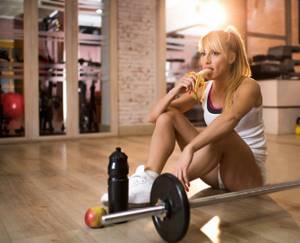
Don't be afraid to eat a couple of bananas after your strength training.
Bananas are the best post-workout carbohydrate
After physical activity, muscle glycogen stores decrease. If the losses are not replenished, a process of muscle cell breakdown begins, called catabolism. You can avoid this by eating something rich in fast carbohydrates.
And then a banana enters the sports arena, 100 grams of which contain an average of 20 grams of carbohydrates. Accordingly: 1-2 bananas within 20 minutes after training - and your blood sugar levels will increase, thereby triggering energy production and muscle growth.
In this sense, banana works as a sports drink. Or even better - if only because bananas do not contain sugar, flavorings and dyes, which are “rich” in sports drinks.
Should you eat bananas before training, how much and why?
Certainly! Before any physical exercise you need a good boost of energy, but where will it come from if you train on an empty stomach? As mentioned earlier, the beneficial elements of bananas are very quickly absorbed by the body, and despite their high calorie content, their moderate consumption and constant training will not allow you to gain weight . Eating two bananas before starting physical activity will increase glycogen levels to the desired level, and this, in turn, will help maintain performance throughout the workout. After this, you will not have a stomach ache during training. Activity and productivity increase, and with them the result.
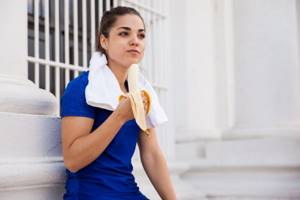
It wouldn't hurt to eat a banana an hour before your workout.
How to eat bananas depending on the type of workout and your goal
For those who want to gain weight, two medium bananas as a snack 10-20 minutes after exercise will be very helpful. Then within an hour you need to eat a full lunch/dinner (meat, boiled vegetables, chicken breast, fresh vegetables and herbs, baked fish, etc.
For those who are in the process of “drying”, one small banana is allowed 20-30 minutes before training or immediately after it. But it is important to remember that the rest of the time you need to adhere to the menu developed for drying - more proteins, less carbohydrates, minimum fat.
But for those who want to lose weight, bananas are not very suitable: after all, 100 grams of banana contains almost 90 calories and a lot of fast carbohydrates. And keep in mind: Dried bananas contain five times more calories than fresh bananas because they contain much less water.
Which banana variety should you choose?
Did you know that bananas come in many varieties? Their variety depends on color, size and taste. But it is unlikely that more than three types of this fruit can be found on the shelves of our supermarkets. However, do not rush to get upset, the most common and best-selling variety is called Cavendish, and it just so happens that it is best suited for use before and after training.
What color should bananas be to prevent abdominal muscles from hurting?
It would seem that the answer to this question is obvious. Almost no one likes green bananas; they are not ripe and sticky. But don’t rush to grab the beautiful and ripe yellow fruits. With almost 100% probability, they were treated with a special gas, which accelerates their ripening, but at the same time takes away a fair amount of nutrients. Therefore, feel free to buy green bananas and let them ripen at your home. The riper the banana, the healthier it is. But not to the point of fanaticism, of course.
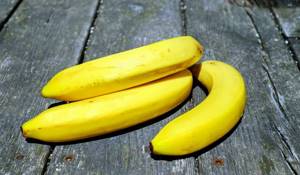
Cavendish is the most common and healthy type of banana.
In short, a banana is a great snack and a way to recharge. Do not deny yourself the pleasure of eating this fruit before, after and even during training. Now you know why you need to eat bananas before and after training, and also how many pieces you need to eat. A banana will not only improve the condition of your entire body and improve your athletic performance, but will also improve your mood, and training with a good attitude and a smile on your face is always more pleasant and productive.
Bananas before training.
Despite all the positive properties of bananas, taking them is not advisable. The fact is that bananas are a high-calorie fruit and contain a large amount of “fast carbohydrates”. When we eat a banana before training, our body receives a large dose of glucose, as a result of which the body receives a signal to process glucose by producing a large amount of insulin. When insulin is produced, sugar in the body drops and with it our endurance and muscle strength drop, followed by fatigue and lethargy. In short, if you went to training to work hard, then you should not eat bananas.
Vitamin and mineral composition of banana
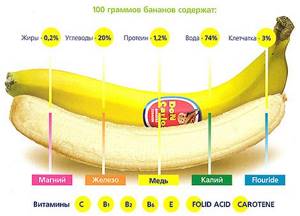
Bananas have a full range of beneficial vitamins and minerals.
We will not describe the entire biochemical composition of the banana. Let us dwell only on the main components of this fruit and consider their effect on the body. 100 g of ripe fresh banana contains the following elements:
- Potassium (348 mg) – maintains optimal water and acid-base balance. Prevents the occurrence of seizures, has a positive effect on the motility of the heart muscle.
- Magnesium (42 mg) – necessary for proper energy metabolism. It has a positive effect on the vascular system and removes excess cholesterol.
- Phosphorus (50 mg) – strengthens the skeletal system.
- Calcium (13 mg) – is responsible for biochemical intracellular processes, bone strength, blood clotting.
- Iron (1.5 mg) – is a component of hemoglobin and is involved in the oxygen supply of body cells.
- Selenium (1 mg) is an element necessary for the proper metabolism of proteins, fats and carbohydrates. Penetrates muscle tissue and supports their contractile activity.
Related: Gloves for strength training
Now let's move on to vitamins. The amount contained in 100 g of fresh banana is indicated in brackets.
- A (20 mcg) – ensures the growth and development of the body, maintains visual acuity, and is responsible for immunity.
- B 1 (0.04 mg) – necessary for the stable functioning of the cardiovascular, nervous, and digestive systems, stabilizes the biochemical processes of the body.
- B 2 (0.05 mg) – stimulates the immune system, supports the functionality of the thyroid gland.
- B 5 (0.3 mg) – participates in the process of assimilation of a number of amino acids, carbohydrates, fats, synthesizes vital fatty acids.
- B 6 (0.8 mg) – necessary for the absorption of proteins and amino acids. Participates in the production of hemoglobin.
- B 9 (10 mcg) – stimulates cellular renewal of the body and suppresses the development of cancer cells.
- C (10 mg) is a powerful antioxidant that ensures redox processes.
- E (0.4 mg) is an antioxidant that prevents the destructive effects of oxidative processes on the body’s cells and strengthens the immune system.
- K (0.5 mcg) – normalizes blood clotting and metabolism in bone tissue.
- PP (1.05 mg) – reduces cholesterol, ensures high-quality blood circulation, and is necessary for oxidative processes.
Banana after a workout: a fad or a real benefit?

Today we will figure out whether you can afford to eat a banana after a workout, or is it better to indulge in it before? Also, how about having a snack right between sets?
So, first, let's dispel a popular myth!
Bananas contribute to obesity.
What nonsense? Yes, 100 g of product (1 piece, medium in size) contains a lot of sugar. In the context of KBZHU, the composition looks like this:
- Protein – 1.5 g;
- Fat – 0.5 g;
- Carbohydrates – 21 g;
- Calorie content – 97 Kcal.
In order to gain weight, you need to eat 2-3 kg of bananas every day, and not move at all.
So what can we conclude? The fruit is rich in carbohydrates, which means it is an excellent source of energy. To figure out when it's best to eat bananas, before or after a workout, think about when you need a source of extra strength.
Let's look at the advantages and disadvantages of using the product at different times relative to training.
